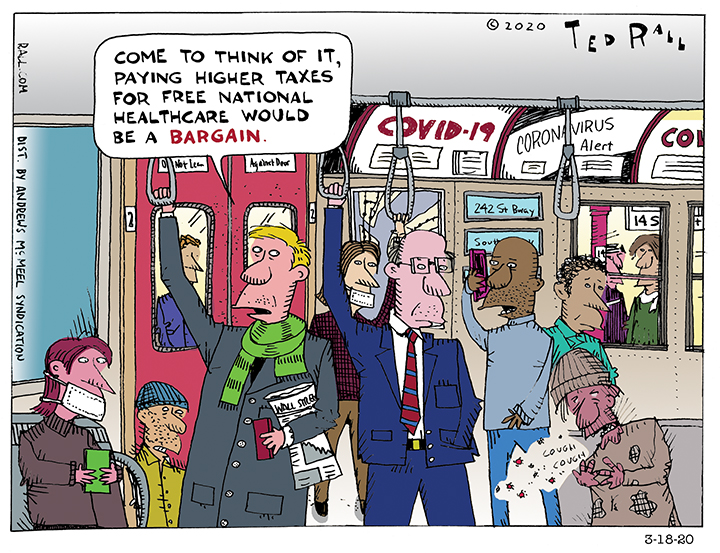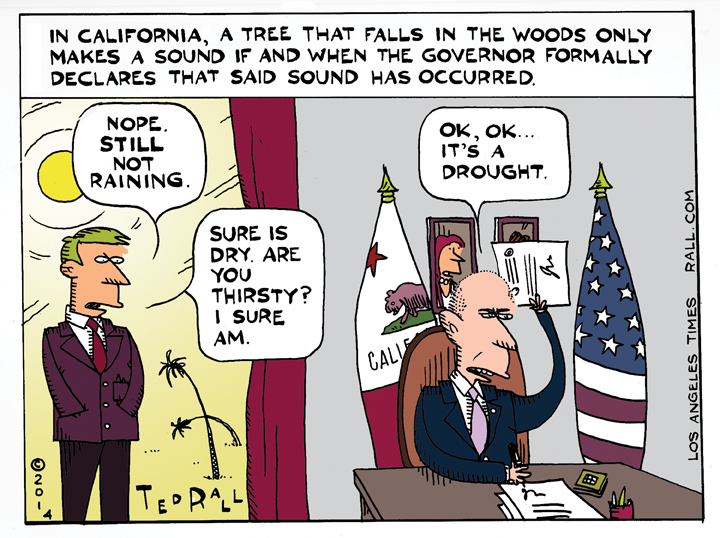
When you crank out five editorial cartoons and a couple of opinion essays a week, not to mention opining on the radio about this issue and that, it is easy to forget about the basics.
The big issues.
The stuff that really matters to you. It’s just as easy to forget to ask: what are our political leaders doing to address our most pressing problems? This is, after all, their job. It’s what we pay them for.
Pew Research Center pollsters regularly ask Americans what they consider to be the problem that worries them most. On April 15th, the #1 Biggest Problem in America was “the affordability of healthcare.” 56% of respondents called huge medical bills “a very big problem” and 30% said it was “a moderately big problem,” for a total of 86%. That’s pretty much everyone. It even includes people who have “good” insurance through their employers.
“Healthcare costs is the only issue of the 15 asked on the survey seen as a very big problem by a majority of Americans, though about half say that the federal budget deficit (49%), violent crime (48%), illegal immigration (48%) and gun violence (48%) are very big problems,” Pew reported.
This is proof positive. The Affordable Care Act obviously hasn’t fixed the problem it was designed to address, skyrocketing medical expenses. According to Gallup, a whopping 80% of patients still worry a great deal or a fair amount about healthcare costs, a number that has remained essentially unchanged year after year since Obama became president.
What are the two major political parties doing about healthcare costs? Not much.
Democrats think we should be grateful for the crappy system we have now. Three weeks ago the White House announced that President Biden had placed a phone call to Obama to celebrate Obamacare’s tenth anniversary. Biden campaigned on adding a “public option” to the ACA but then left it out of his budget. He floated reducing the eligibility age for Medicare from 65 to 60, then dropped the idea when asked where the money would come from. Democrats have no plans to fix Obamacare; they think it’s perfect as is.
Not that the Republicans are any better.
The Supreme Court ruling in favor of the ACA has forced the GOP to give up on its vague Trump-era “repeal and replace” mantra. Now they’re saying nothing at all. “If the Republicans have a health care agenda, they haven’t shown their cards,” Drew Altman, who runs the Kaiser Family Foundation, recently told Politico. They whine about Obamacare to get votes. But they don’t want to change it.
To recap: Americans worry about high doctors’ bills more than any other single issue. Yet neither party is even talking about, much less trying to actually do, anything to ease our pain. No wonder only 31% of Americans think Congress is doing a good job.
Run down the list of Americans’ other top priorities and you’ll find the same lack of responsiveness from “our” elected officials. Forget actual action. Our “public servants” don’t bother to give us lip service.
So it goes with other Big Worries: no action, no ideas, no hope.
Biden’s coronavirus-recovery and infrastructure spending plans blow up the budget deficit that voters cite as their #2 most worrisome issue; Democrats have no plan to offset their spending by, for example, slashing the constantly bloated Pentagon budget. Republicans, obsessed with social issues, issue easily-ignored boilerplate statements that the deficit is too high that presents “like a rote effort; like Republican karaoke,” as Scott Galupo described it in The Week. Not that Republicans have any credibility on the issue of fiscal responsibility.
On the #3 Big Issue, violent crime, both parties offer, again, nothing. Republicans and Democrats alike are urging municipalities to not defund the police, i.e., they want force levels and tactics to remain where they are now. Neither party offers an alternative or additional approach, like an initiative to increase access to mental-health treatment. In the absence of a new response nothing much will substantially change, as Biden tells donors.
Neither party has a real plan to address Top Issue #4, illegal immigration, or #5, gun violence. Democrats and Republicans alike intend to leave the southern border partially open in order to allow employers access to cheap labor, while continuing mass deportations to terrorize those workers into accepting slave wages. Neither party wants to do anything substantial about the proliferation of handguns used in the current spasm of violent crime, or question whether we still need the Second Amendment in the 21st century.
My point here is not to discuss the specifics of healthcare, the deficit, crime, etc. or what the best solutions to those problems are. Nor am I out to blame one party more than the other. My point is that neither the president nor Congress nor either of the two major parties is addressing the issues we care about in a credible way. When a political system fails to respond to people’s concerns or even take them seriously in the first place, it is doomed.
No one should be surprised when the whole bankrupt piece of garbage implodes.
(Ted Rall (Twitter: @tedrall), the political cartoonist, columnist and graphic novelist, is the author of a new graphic novel about a journalist gone bad, “The Stringer.” Now available to order. You can support Ted’s hard-hitting political cartoons and columns and see his work first by sponsoring his work on Patreon.)

